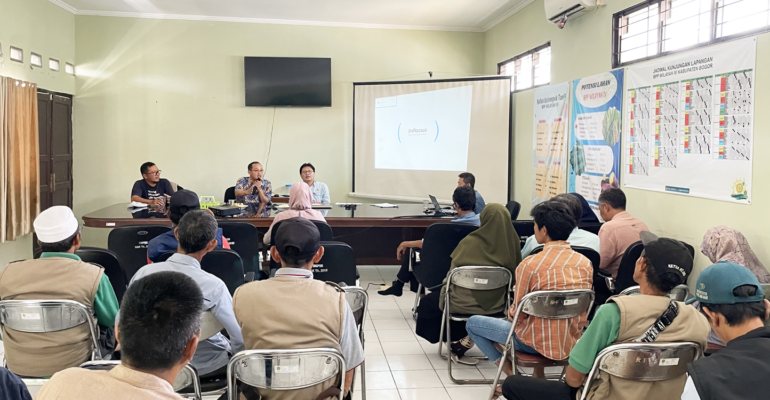DPMA IPB University Socialises Village Business Ecosystem Development at BPP Cibungbulang

The Directorate of Agromaritime Community Development (DPMA) of IPB University provided counselling to the Agricultural Extension Agency (BPP) of Bogor Regency Region IV regarding the development of the agricultural village business ecosystem which took place at the BPP Cibungbulang Office. This activity aims to strengthen the development of village business ecosystems by involving various related parties.
The event was held on Tuesday, 28/5 and was attended by Field Agricultural Extension Workers (PPL) and Independent Agricultural Extension Workers (PPS) of Ciampea District, Cibungbulang District, Pamijahan District and Tenjolaya District.
Dr Iqbal Irfany and Sarwono, SP from DPMA IPB University presented various collaborative programmes to develop village business ecosystems. These programmes include the development of superior commodities such as yam, taro and kepok banana. In addition, DPMA IPB University also provides facilitation of assistance and establishes partnership cooperation to support farmers and business actors in the village.
Dr Iqbal Irfany explained the importance of synergy between the government, extension workers, and village communities in developing local potential. “We want to ensure that every village can optimise their superior commodities through proper assistance and cooperation. This is an important step in improving the welfare of rural communities,” he said.
Meanwhile, Sarwono added that the mentoring facilitation programme aims to provide farmers with the knowledge and skills needed to manage their agricultural businesses. “With the right assistance, we hope farmers can improve the productivity and quality of their agricultural products,” Sarwono said.
The socialisation participants welcomed the initiative and hoped that the programmes presented could be realised soon. Participants also realised that the development of village business ecosystems requires strong collaboration between various parties.
This activity is expected to be an effective first step in strengthening village economic development, increasing the competitiveness of local commodities and creating new jobs for rural communities. Thus, sustainable development in Bogor Regency can be realised. (*/Lp) (IAAS/RUM)



